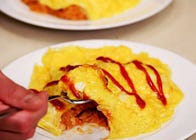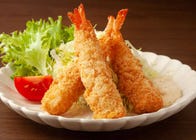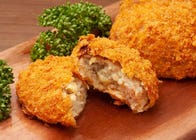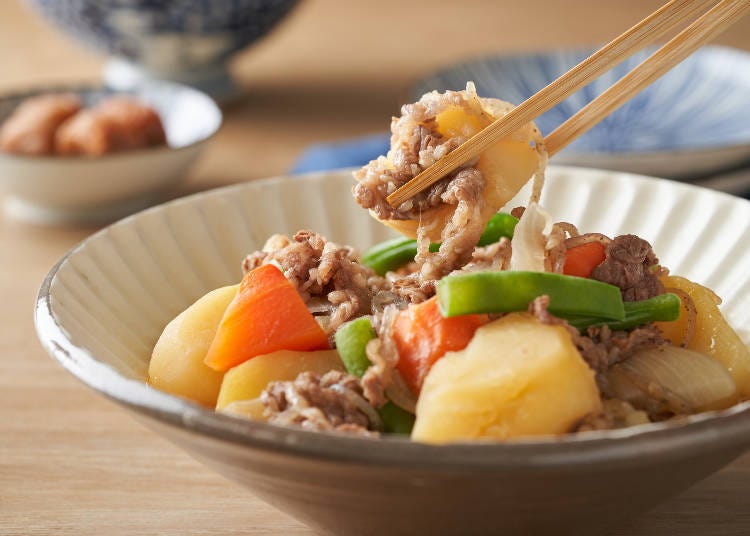
Nikujaga is a long-time favorite Japanese dish, consisting of stir-fried meat and potatoes, sweetened with soy sauce and sugar.
Here we will introduce a special nikujaga recipe developed and prepared by cooking instructor Mr. Toshihiro Minami. We'll also include a video for your ease and convenience.
The main ingredients are beef and potatoes, available at most supermarkets near you. So don't worry if you can't make it to Japan. This is a classic Japanese dish that anyone can cook at home!
Main image: PIXTA
The origin of Nikujaga: A failed beef stew recipe
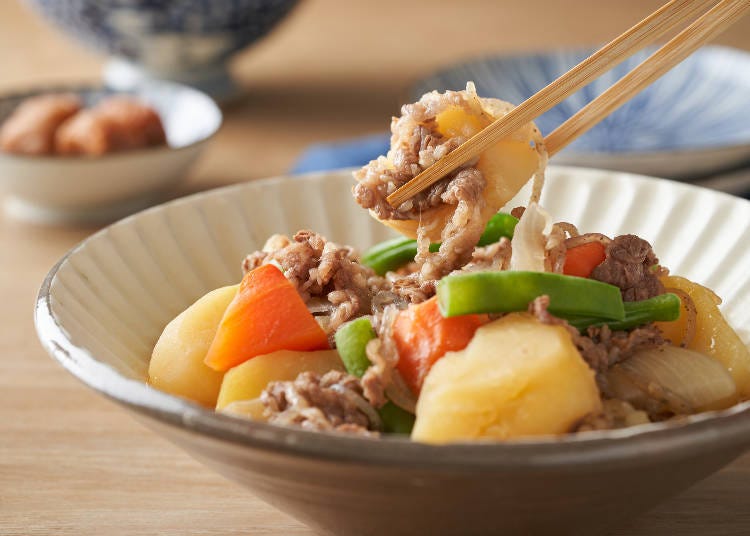
Nikujaga is made by stir-frying beef, pork, potatoes, onions, and carrots, then sweetening with soy sauce, sugar, and mirin.
There are various theories about the birth of nikujaga. One theory originates in the Meiji Period (1868-1912), suggesting that the dish was the result of a chef's failed beef stew recipe that was requested by Navy Commander Heihachiro Togo on his warship.
Because nikujaga is rich in nutrition and easy to make, it has become a modern-day signature dish in many Japanese homes. Recipes and tastes may differ by region, however. While many people in the Kanto Region prefer to use pork, people in the Kansai Region tend to use beef. Today's recipe will be for a main dish using beef.
The secret to making perfect Nikujaga: Cut ingredients the same size to prevent crumbling!
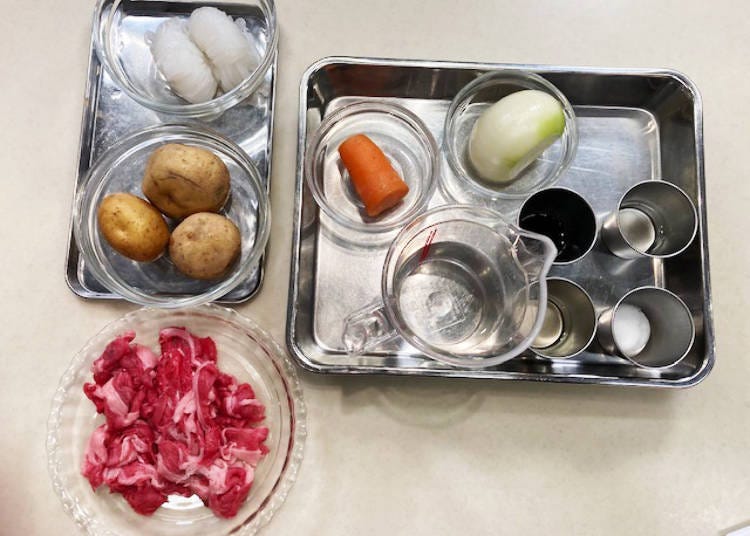
Nikujaga Ingredients (Serves 2 people)
・150g sliced beef (may substitute pork or chicken)
・3 small potatoes
・1/2 carrot
・1/2 onion
・1 pack shirataki noodles (100g) (*may substitute with glass noodles)
・300ml water
・Vegetable oil
・3 tbsp soy sauce
・2 tbsp sake (may substitute with white wine)
・1 tbsp sugar
・2 tbsp mirin
*If you don't have mirin, see our video on How to Make Oyakodon.
How to Make Nikujaga
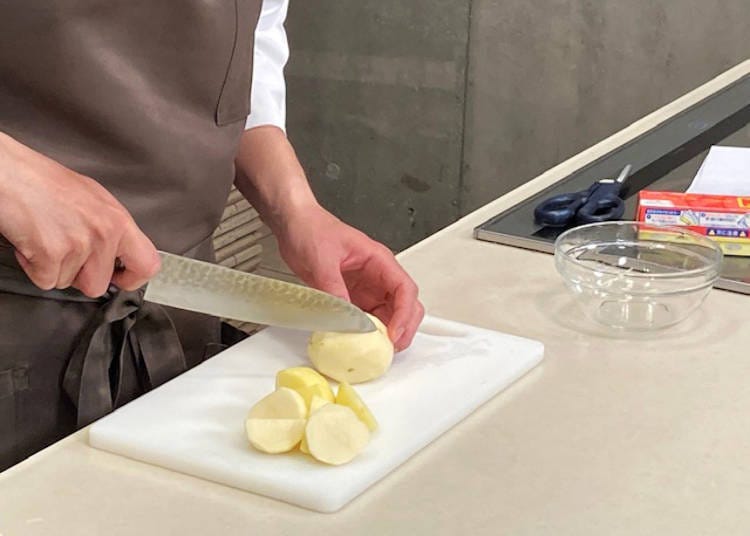
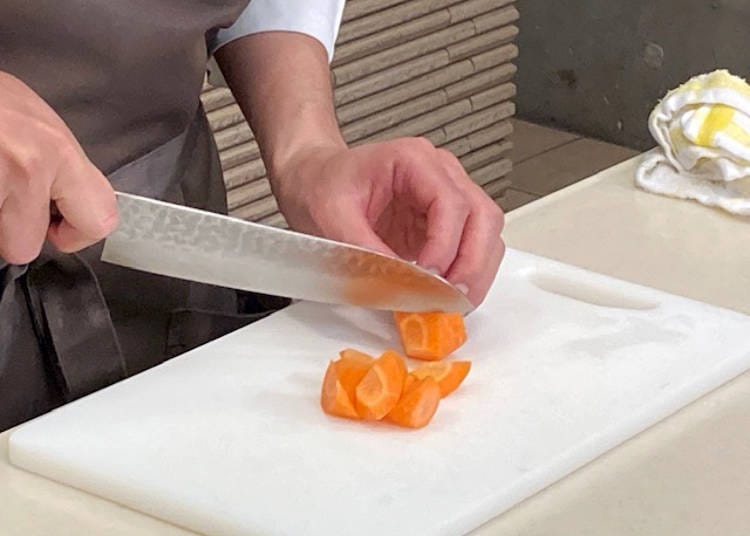
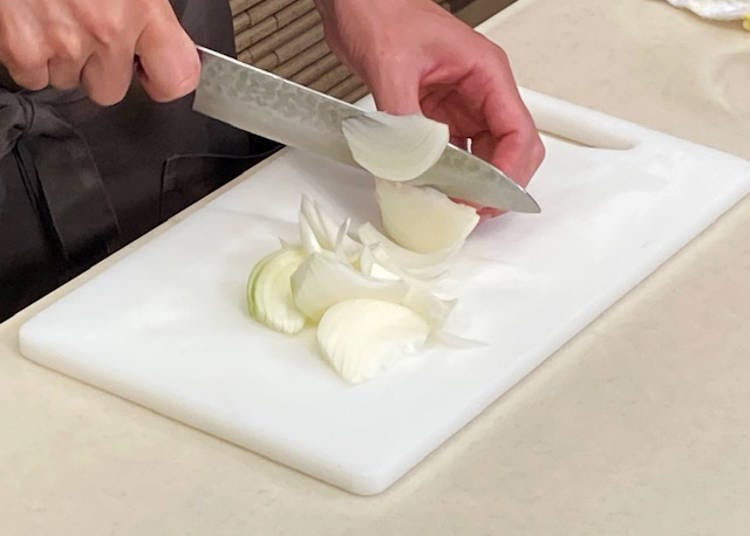
1. Peel potatoes and carrots and chop them into small pieces. Peel onions and cut them into wedges. Cutting the potatoes like this makes them less likely to fall apart in the water.
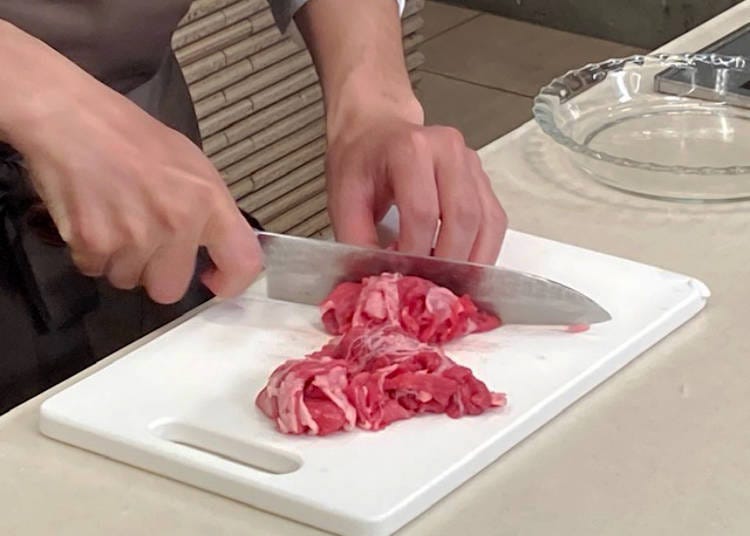
2. Cut beef into bite-sized pieces.
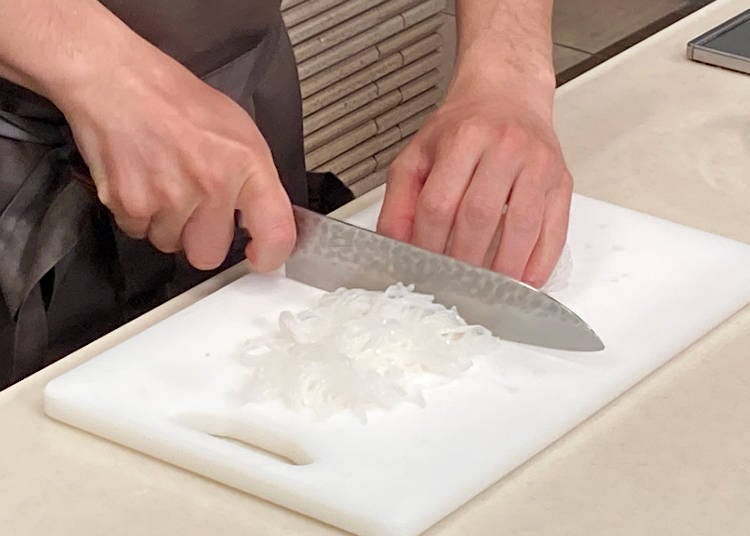
Rinse shirataki noodles with water and cut them into bite-sized chunks.
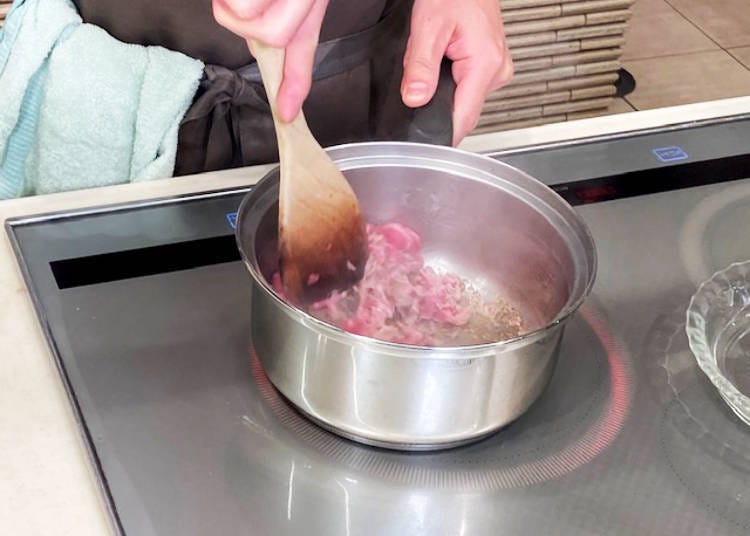
3. Heat vegetable oil in a pot or pan over medium heat, add chopped beef and fry. Remove meat immediately once brown. Over-frying will result in a tough texture, so it is important to remove it quickly.
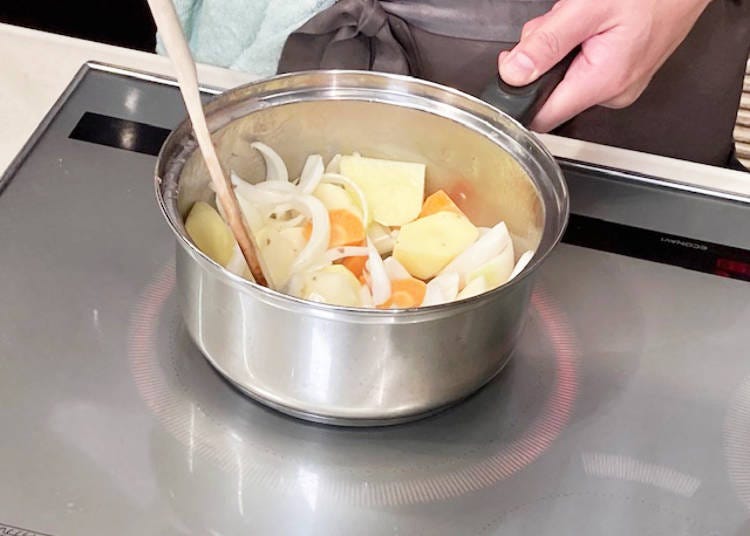
4. Put potatoes, carrots, and onions in the empty pan and fry until the surface of the potatoes becomes slightly translucent.
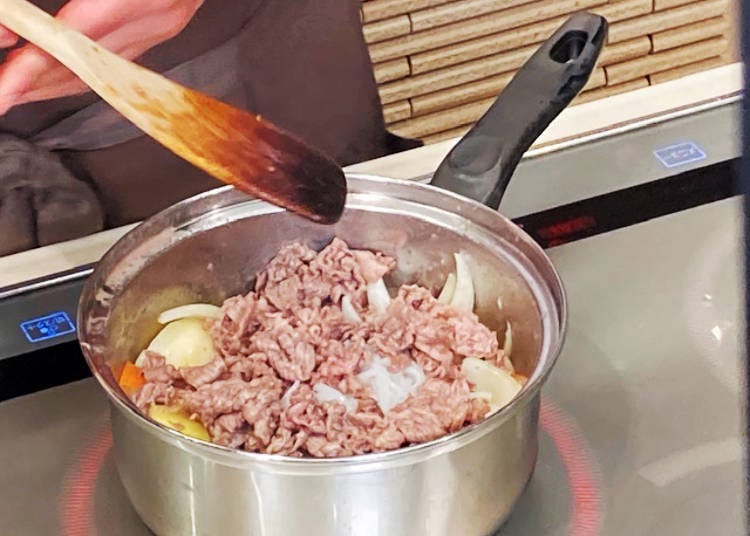
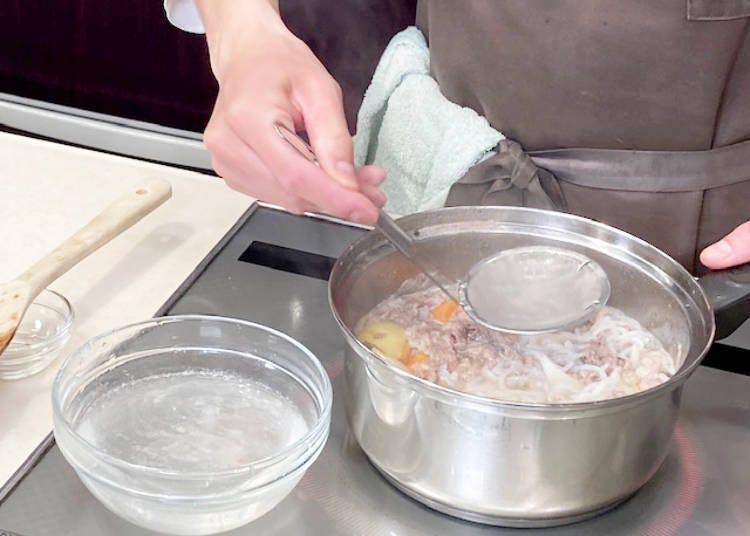
5. Once the surface of the potatoes has changed in color, add shirataki noodles (or glass noodles) and the previously removed beef. Add water and boil, then remove any frothy film.
The froth will gather in the center, so scoop it out carefully. Watch the heat and don't let it boil too much; otherwise, the froth will spread.
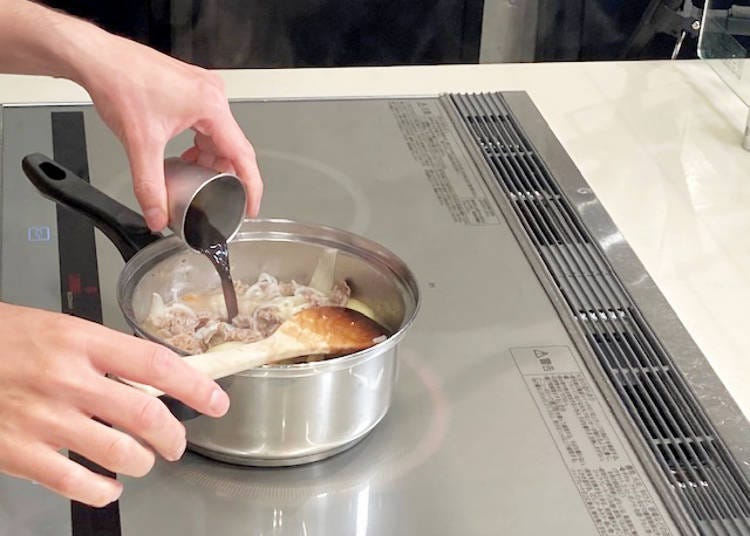
6. Add sake, sugar, soy sauce, and mirin, stirring each time. Create a makeshift otoshibuta, or drop lid, by covering the pot with aluminum foil and poking a hole in the center. Boil on low heat for about 10 minutes.
Covering the pot with this lid prevents simmered dishes from falling apart while cooking, and makes it easier for the flavor to soak in.
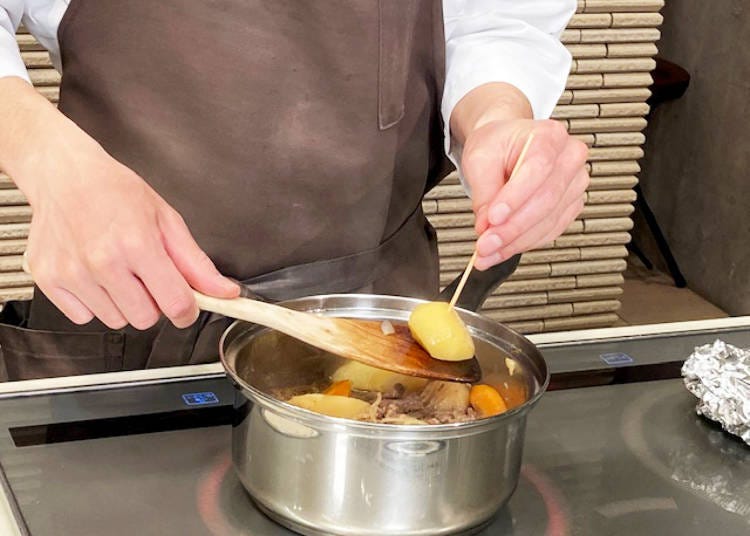
7. Boil until about 1/3 of the broth remains. Remove the lid, and change the temperature to medium heat. Stir vigorously and simmer for another 1 to 2 minutes. Skewer the potatoes. Once your utensil passes through easily, they're done.
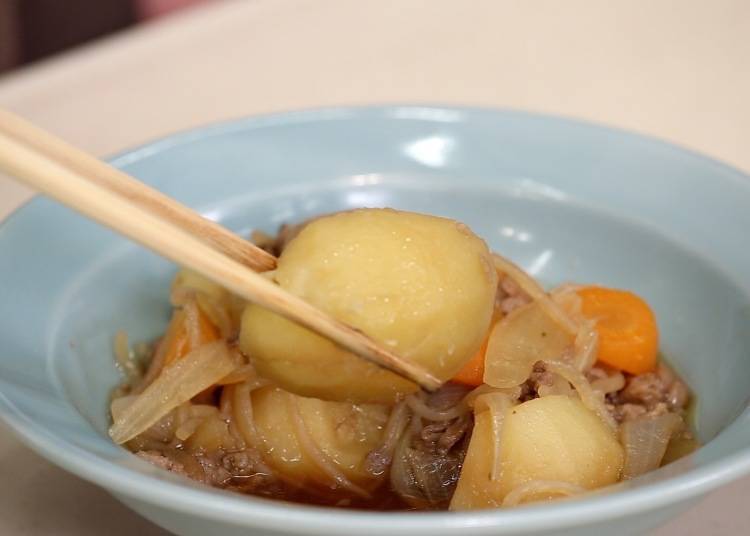
The ingredients will absorb even more flavor if left to cool after cooking. If you have time to spare, we recommend turning off the heat and letting it sit in the broth and cool before eating.
If you let the potatoes boil for too long, they may fall apart in the water. Make sure to cook ingredients for a short time and boil down the broth. You can eat nikujaga with the broth as-is, or together with rice.
Chef Profile:
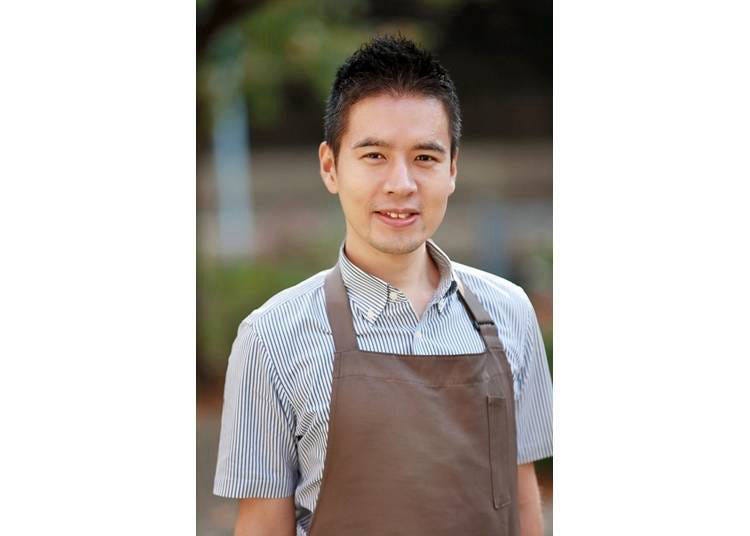
Toshihiro Minami, manager of cooking studio Osaka Delicious. After becoming a working member of society, he returned to school and changed careers, becoming a cooking instructor. He serves as a lecturer at cooking studio Osaka Delicious, while concurrently working on recipe development, as a cooking assistant, and on making TV appearances. In addition to general Japanese dishes, he can prepare a wide variety of foods, including Western and Chinese cuisine.
Text by: Efeel Co., Ltd.
*Information in article as of December 2021.
Translated by: Krys Suzuki
*Prices and options mentioned are subject to change.
*Unless stated otherwise, all prices include tax.
Popular Tours & Activitiess
Recommended places for you
-

KitazuienUmeda
Japanese cuisine
Umeda, Osaka Station, Kitashinchi
-

Hachiko
Japanese cuisine
Umeda, Osaka Station, Kitashinchi
-

Ichii
Japanese cuisine
Namba, Dotonbori, Shinsaibashi
-

Asai
Japanese cuisine
Namba, Dotonbori, Shinsaibashi
-

Kappo Kishu
Japanese cuisine
Arashiyama, Uzumasa
-

MINOKICHIHoteruhankyuintanashonaru
Japanese cuisine
Umeda, Osaka Station, Kitashinchi
-

Vintage Watch Hunting in Osaka (Umeda & Shinsaibashi): Rolex, Seiko, and Rare Finds
-
Ad

Iseshi Station: Gateway to Japan’s Sacred Heart and the Evolving Ise-Shima Region
-
Ad

Discover Kyoto by the Sea: Explore Nature, History, and Culinary Tradition in "Another Kyoto"
-
Ad

Kumano Kodo's Nakahechi Route: A World Heritage Journey Starting from Kii-Tanabe Station
-
Ad

Earthquake in Kyoto? Typhoon? What To Do If Disaster Strikes During Your Stay
-
Ad

4 Recommended Restaurants Open After 9 PM Near JR Nara and Kintetsu Nara Station
by: Shingo Teraoka
-

10 Important Japanese Phrases to Know Before You Enter a Japanese Convenience Store!
by: Teni Wada
-

Dining in Arashiyama: 18 Must-Try Restaurants for Scenic Kyoto Cuisine
by: Wong Man Yee
-

Inside Kobe Tower: Fun Things to Do at the Symbol of Kobe
-

Enjoy Kaiseki in Kyoto: 6 Must-Visit Restaurants in Gion
by: Guest Contributor
-

Dining in Gion (Kyoto): 40 Best Restaurants for Kaiseki, Sushi, and Matcha Desserts
by: Wong Man Yee
-

Ultimate Tokyo Transit Guide: JR, Subways, and Private Railways Explained, Plus Suica/PASMO and Money-Saving Passes
- #best gourmet Osaka
- #things to do Osaka
- #what to do in kyoto
- #what to bring to japan
- #best gourmet Kyoto
- #new years in Osaka
- #what to buy in nanba
- #Visiting Osaka
- #onsen tattoo friendly arima
- #daiso
- #Visiting Kyoto
- #best japanese soft drinks
- #japanese fashion culture
- #japanese convenience store snacks
- #japanese nail trends















